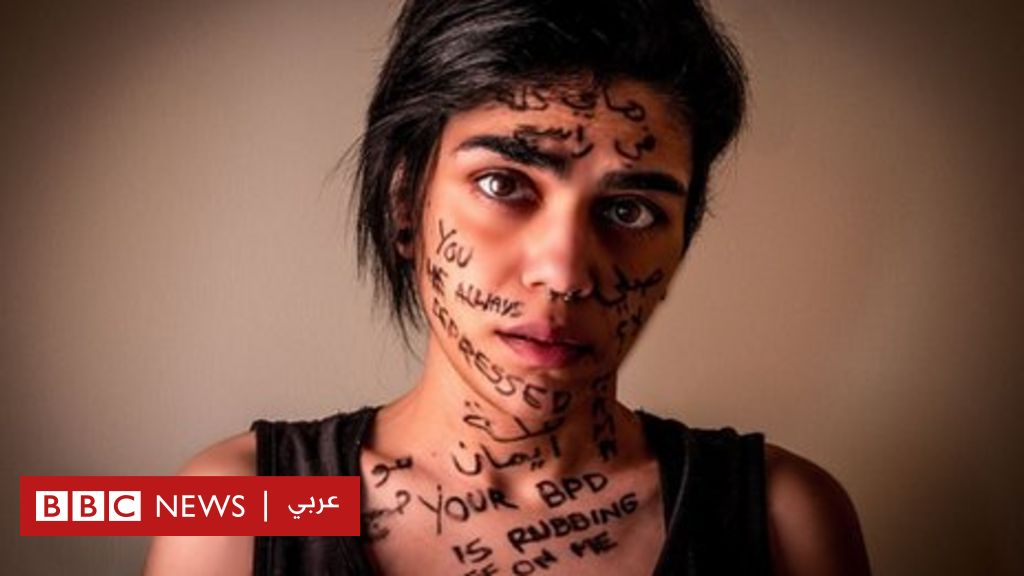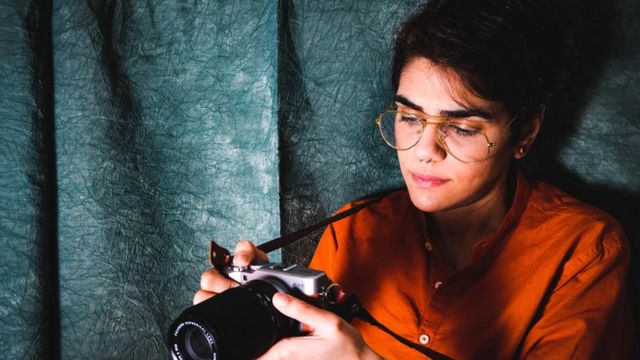
[ad_1]
- Sumaya bakhsh
- BBC

Published photo, Enas Sistani
Enas uses his photography skills to talk about mental health
Bahraini’s hand, Inas Sistani, trembled as she stood in front of the mirror, holding the kohl pencil to bypass her eyes Remembering the words her friends and relatives kept repeating, she started to cry and wrote on her cheeks and neck: “You are still depressed”. “Are you praying?”; “These are just fantasies going through your head.”
A year ago, Enas was diagnosed with borderline personality disorder.
Inas is responsible for one of the projects carried out by an international organization operating in Bahrain, but as soon as she finishes her work, she is busy pursuing her passion as a visual artist whose aim is to publish photos on her Instagram account to show the impact. mental health problems and psychological violence on people.
She tells the BBC: “I decided to show people how much these things can affect a person. They leave scars that you always carry with you.”
“I didn’t know if I was normal or not.”
The 34-year-old began using photography to break the silence around mental illness as a teenager – that’s when she began to experience symptoms of depression.
Enas remembers that time her mother took her to see a psychologist, because her first question was, “Are you praying?” Do you read the Koran? ”
And she comments: “I thought at the time that the matter had nothing to do with religion. Even if I prayed, and even if I read the Quran, what does that have to do with that?” And Enas did not return to see the specialist after this experience.
But she continued to suffer from several symptoms, including depression and severe mood swings which escalated in 2019 while studying for a masters degree at a university in the United States of America, so she decided to see a psychiatrist and was diagnosed with borderline personality disorder.
The American Psychiatric Association has developed diagnostic criteria for BPD, including chronic feelings of emptiness, impulsivity, self-harming behaviors, and unstable relationships. It is a complex disease that can only be diagnosed by a healthcare professional.
The discovery by Enas that she was suffering from a known psychological condition was a source of relief for her. “I felt lost. I didn’t know what was wrong with me. I didn’t know if I was a normal person or not. So, it made it easier for me to know what I was suffering from. hands of a professional., and I was able to educate myself and know how to better manage my feelings. “
Published photo, Enas Sistani
Enas began to suffer from depression during his teenage years
A mental hospital in Bahrain
Inas began her engagement in psychotherapy and meditation sessions since returning to her country, Bahrain. The psychotherapist you are dealing with lives in Britain, so the sessions with him are done through the Zoom app, and what is surprising is that the cost of these sessions is much less than what you would have paid for. a therapist in Bahrain.
Bahrain has a population of 1.7 million and there is only one general psychiatric hospital, as well as private mental health facilities.
Enas does not see the high cost and the lack of availability of mental health services in his country as the real obstacles. Rather, she believes that the biggest obstacle preventing her from seeking professional psychological help is the lack of understanding of mental illness and the stigmatization of the psychiatric patient in Arab countries. “People often confuse mental health with the knowledge we have learned from existing traditions,” she says. “We have to distinguish between spirituality and belief and between diseases and facts based on science.”
Speak out
Published photo, Enas Sistani
Inas wants to encourage people to talk about mental health issues
Inas treats comfortably and is open when she talks to him, but at times she loses confidence and feels hesitant. She pauses, asks me if she’s talked too much, remembers that she still struggles to talk about the challenges she’s been through the past few years.
But she believes it is very important to speak openly about these matters in order to help resolve prevalent misconceptions. That’s why, shortly after returning from the United States, she agreed to talk about her mental health issues in a live Instagram feed managed by one of her friends.
The day before the live show, Ines was terrified and almost changed her mind. This will be the first time you speak publicly about your mental health journey.
But all her doubts faded by the time she finished this online chat.
She was inundated with private messages from people she didn’t know who contacted her, shared their own stories and asked for her opinion.
Inas says her family have been very supportive, so she felt sympathy for those who contacted her; Many of them told him that they couldn’t tell their family and friends about what they were going through.
The role of social media
Published photo, Enas Sistani
And she’ll keep using art to get her messages across
Inas says that over the past few years she has witnessed positive change in speaking out about mental illness and believes social media has played a major role in that regard. “In the past it was very difficult to talk about (mental illness). Growing up people didn’t refer to someone as having a mental illness but said, ‘He’s crazy. “It’s really impressive to see the new generation sharing their experiences in this area. They are taking this issue out of the taboo circle.”
She adds that social media has allowed her to connect with others who are having similar experiences to her in ways that were not possible before. “Everyone who contacted me did so on social media, and they felt more comfortable (talking about these issues) behind the screen.”
Enas says she is optimistic about what the future holds. The bonds she has forged with others by sharing her story have given her the courage to persevere. “It was a great trip. It made me want to continue using the arts and photography to reach as many people as possible. And if that helped them … that would be amazing.”
Source link